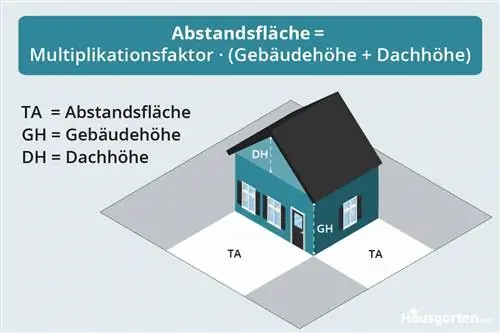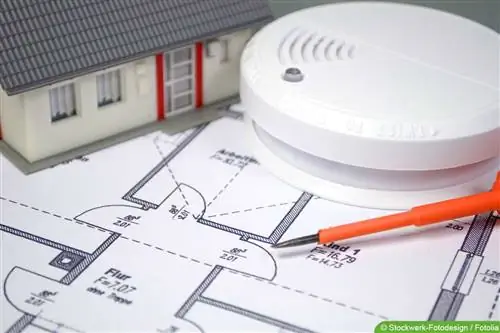- Author admin caroline@plants-knowledge.com.
- Public 2023-12-17 03:39.
- Last modified 2025-01-24 12:45.
Sufficient distance must be maintained from the property line when building a building project, such as a garden house. You can find out how large the distance area must be and which areas are responsible here.
What is border development?
The standard and orientation in Germany is a distance of three meters from the border. However, if the building is to be closer, it is considered a development on the border.
Exact regulations can be found in the respective state building regulations. In addition, the respective building authority is of course responsible.
In addition, differences are made between different buildings. A carport or a small garden house is subject to different rules than a multi-story residential building.
Note:
Three meters is only considered an absolute minimum and a guide. However, the distance area is calculated to determine the actual distance to be maintained.
Calculate distance area
There is a significant difference whether the neighbor wants to build a three meter high stone wall directly in front of your living room window or just a low fence made of wood or metal to make the garden dog-proof. Therefore, there are no general dimensions other than the minimum distance. Instead, this is calculated using a formula.
Requires:
- Roof height
- Building height
- applicable multiplication factor
It is calculated as follows:
Distance area (TA)=multiplication factor x (building height + roof height)
In addition, the roof height may only be partially taken into account if the slope is low.
An example can make this clear:
A single-family home is to be built on the edge of the village. The building itself is six meters high and has a three meter high roof. However, the roof pitch is so low that only a third of it is taken into account. The multiplication factor is one.
This results in this calculation:
- Multiplication factor
- Building height 6.0 m
- Roof 3.0 m (only 1/3 credit)
TA=1 x (6 + 1/3 x 3)=1 x (7)=7 m
A distance of seven meters from the property line must therefore be maintained. There is a difference in core areas in Bavaria. If the house were in the middle of the village center, the factor would only be 0.5. So it would only have to be half that distance and therefore 3.5 meters away.

Tip:
This already shows how complex this topic is. Therefore, make sure you contact the relevant authorities and your neighbors, even if you only want to build a small shed. This will help you prevent later disputes.
Regulation in federal states B to M
Baden-Württemberg
The state building regulations of the federal state of Baden-Württemberg lay down the rules for development in paragraph 4. §5 and §6 are specifically designed for distances and special cases. A division is made into urban, village and industrial areas. The minimum distance is 2.5 meters.
Bavaria
The regulations of the Bavarian State Building Code regarding distance are set out in Article 6. The minimum distance is 2.5 meters in most cases, but this varies depending on the region and municipality. Special cases can also be found.
Berlin
In the state building regulations for Berlin (BauO Bln) all regulations regarding the necessary distances can be found under paragraph 6.
- § 67 of the BauO Bln indicates exceptions to the distance regulation
- the minimum distance is between 2, 5 and 3 meters
- a factor of 0.4 is expected in residential areas
- In industrial and commercial areas, the factor 0.2 is sufficient for the calculation
Note:
The comparatively low factors for calculating the respective distance areas come from the fact that Berlin has a very high population density. As a result, there is generally less space available, which does not allow large distances to borders.
Brandenburg
The Brandenburg Building Code (BbgBO) states in Section 6 which distances must be maintained. Various changes have been in effect since 2016. Below:
- reducing the calculation factor to 0.4 in residential areas
- in industrial and commercial areas the factor is only 0.2
- Minimum distance must not be less than three meters
These rules apply even though Brandenburg is comparatively sparsely populated and numerous building plots could still be developed. However, there is little interest in this in more remote areas outside of Berlin. Therefore, the guidelines will be relaxed in the more popular regions.
Bremen
The Bremen State Building Code (BremmLBO) stipulates in Section 6 which rules must be adhered to. These include, among others:
- Distance must be at least three meters from the border
- Exceptions are very low ones, some of which only have to be one and a half meters away
- factors 0.4 are used in residential areas and 0.2 in industrial and commercial areas
- Height and type of buildings play crucial roles
Hamburg
The Hamburg Building Code (HBauO) stipulates in Section 6 what is permitted and what is prohibited in development. These include, among others:
- use factor 0, 4 in residential areas
- Industrial and commercial areas only need the factor 0.2
- Minimum distance of 2.5 meters in all areas
Hesse
Section 6 of the Hessian Building Code (HBO) regulates border development in the federal state. Here too, the factors 0.4 are used for residential areas and 0.2 for commercial and industrial areas. The minimum distance is in any case three meters.
Mecklenburg-Western Pomerania
The regulations are similar in this federal state too. They are recorded in Section 6 of the Mecklenburg-Western Pomerania State Building Code (LBauO M-V).
- Factor 0, 4 in residential areas
- Factor 0, 2 in industrial and commercial areas
- Minimum distance to property line three meters
Regulation in federal states N to T

Lower Saxony
The Lower Saxony Building Code (NBauO) lists in Section 5 the distance to neighbors that must be maintained. The following applies:
- Distance must be at least three meters
- Factor 0.5 in residential areas
- Factor 0.25 in commercial and industrial areas
North Rhine-Westphalia
The state building regulations of North Rhine-Westphalia (BauO NRW) are similar to many other federal states in terms of their basic distance regulations. The minimum distance must be maintained in any case and is three meters. There are very few exceptions to this, for example in the case of short roof overhangs, which can only be 50 centimeters long. The factors are 0.5 in populated areas and 0.25 in industrial and commercial sections.
Rhineland-Palatinate
The Rhineland-Palatinate State Building Code (LBauO) stipulates in Section 8 what you must adhere to when building on the property boundary. Key points include:
- Factor 0, 4 in residential areas
- Factor 0.25 in commercial areas and industry
- Minimum distance three meters
Note:
The minimum distance remains in metropolitan areas with dense population. However, exceptions can be made to the factor for calculation.
Saarland
The State Building Code (LBO) of Saarland has § 7 noted in Part 2 and again does not differ much from the other federal states.
- Calculate the distance area in residential areas with a factor of 0.4
- for industrial areas 0, 2 are sufficient
- Minimum distance three meters
Saxony
The Saxony building regulations (SächsBO) also specify in Section 6 which basic rules apply. These are:
- Exceptions and smaller distances are possible in commercial areas
- Factor in residential areas 0, 4
- general minimum distance three meters
Saxony-Anh alt
In the building regulations of Saxony-Anh alt (BauO LSA), everything important about border development and the distance area is summarized in Section 6.
- Factor 0, 4 in residential areas
- smaller distances may be possible in industrial areas
- Minimum distance three meters
Schleswig-Holstein
The LBO also applies in Schleswig-Holstein and Section 6 provides important guidance.
- depending on the type of building and area, very small distances are possible
- In residential areas a factor of 0.4 applies
- general minimum distance three meters
Thuringia
The Thuringian Building Code (ThürBO) shows all the important regulations in Section 6. These are:
- Factor in residential areas 0, 4
- Commercial areas and industrial areas factor 0, 2
- Minimum distance three meters
Special regulations and exceptions
In every federal state there are special regulations for special buildings and circumstances. For example, distances can often be smaller if it is a small garden house, a carport or lower structures. However, approval must first be obtained from the responsible authority.






